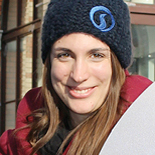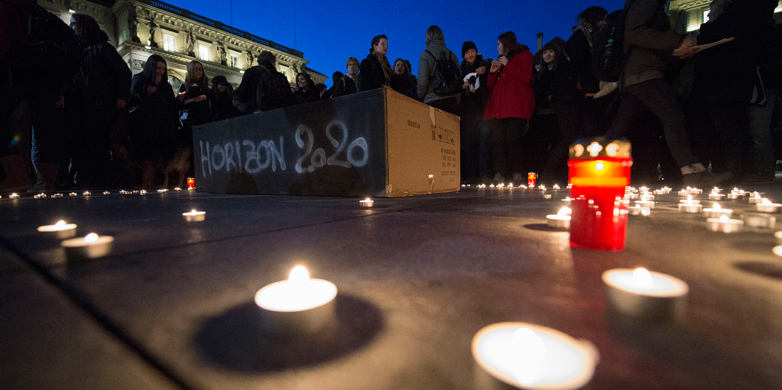Not without us
The referendum on limiting immigration abruptly added a new item to the political agenda of Swiss students. VSETH President Julia Wysling has seen the effects first hand.
“Life is what happens while you're busy making other plans” – the quote on the door to my office could hardly be a more precise description of how the weeks after 9 February passed for VSETH. The meticulously planned projects for February and March, which included installing an ice rink on Hönggerberg, issuing a statement on the election of the Rector and conducting targeted lobbying in the National Council in relation to tuition fees, among other things, were suddenly dwarfed by a new topic: the mass immigration initiative and its effects on the European education and research programmes of Erasmus+ and Horizon 2020.
From one day to the next, we were forced to implement the previously planned projects and simultaneously answer questions from unsettled students and respond to media enquiries.
It is difficult to respond to such enquiries while we ourselves, like many others, still had no reliable information, in particular if you lack years of experience in giving interviews and therefore the ability to weigh up the effect of your own words. But we also understood that the media were giving us an opportunity to voice the students’ views. And so, during several night shifts and with our national umbrella organisation VSS (Swiss association of students) and the associated student unions in the canton of Zurich, we drafted press releases on the latest developments, gave regular interviews and published a ‘mass immigration’ dossier on the VSETH website with information on the topic in German and English.
In stark contrast to the usually very cautious and considered approach of VSETH in university topics, we were suddenly forced to take decisions on the spot: do we position ourselves in relation to the latest developments, and if so, in what way? Only during this time did I realise why VSETH has an executive body (the VSETH Board): even if one might like a consultation period for all statements, which provides the opportunity of representing the broadly based opinion of the student body, there are times when things need to move fast and when I, as the President, am called upon to do what I was elected to do: to represent the students and their opinions to the best of my knowledge and ability.
It was also clear to us that it would no longer suffice to merely respond to enquiries from the media or decisions made by politicians. It was time to set a marker for the future: this marker is the Appeal for an Open European Higher Education Area, which we have published together with other education and research representatives on external pagewww.not-without-switzerland.orgcall_made, and which has been signed by more than 20,000 people in the space of just one week.
Now that the discussion in the media about the effects of the mass immigration initiative on students and researchers is gradually abating again, VSETH is also calming down a bit. But instead of licking our wounds, we have planned the further procedure: even though the media are no longer reporting about this topic on a daily basis, the consequences of the mass immigration initiative continue to affect students. Even if the Swiss federation and ETH have initiated transition measures for students and researchers, there is still a great deal of uncertainty: what will happen after 2014? Has the EU suspended Switzerland’s participation in Erasmus+ and Horizon 2020 only temporarily or for the long term?
These questions show that we are discussing the effects of the referendum at ETH as a whole, not only among the students, and must come to the necessary conclusions in order to represent our position distinctly and clearly in the future.
To my mind, the foundation of this position should be the following principle from the appeal: “We hereby express our commitment to an open European and international higher education area, and emphasise our will to continue to foster and promote international exchange at our higher education institutions.”
About the author

In November 2013, Julia Wysling was elected President of VSETH by the Council of Members, the highest body in the Student Association VSETH. She was born in Zurich in 1990 and grew up in Zurich, Vienna and most recently in Uster. Having successfully completed her studies at the Kantonsschule Rämibühl, which included an exchange year in Australia, she has been studying mathematics at ETH Zurich since 2009. Julia had previously already played an active part in the Mathematicians’ and Physicists’ Association (VMP), in various VSETH committees and in the SoNaFe/WiNaFe Association, which organises the summer and winter end-of-semester parties at ETH Zurich. One aspect of her work in VSETH, which she finds particularly fascinating, is how the students’ political representation influences the range of services on offer. In her free time, Julia spends her time training for a triathlon.

